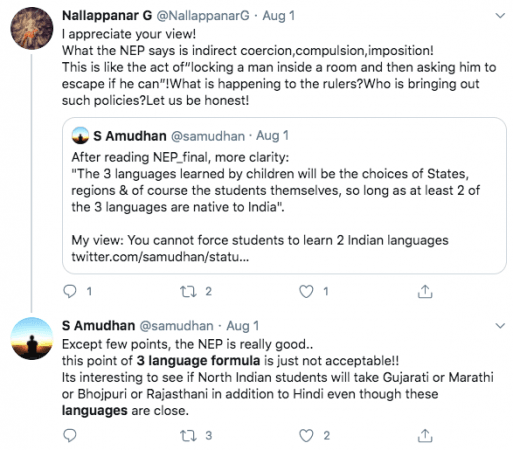
Language has long since been considered a 'unifier'. In India, it has often been a 'divider'. The New Education Policy, which recently was announced by the central government, is barely a few days old. It has already sparked a debate.
On Monday, Tamil Nadu CM Edappadi Palaniswami said he found the 3-language formula 'painful and saddening'. Tamil Nadu, which has been following the 2-language policy, has found the New Education Policy a threat.
3-language formula: The history
To understand why Tamil Nadu resists the NEP today, it's necessary to understand why it's been resisting it for years now since independence. The backlash against the imposition of Hindi on non-Hindi speaking states goes far back.
It began with the first protest in 1937 against the compulsory teaching of Hindi in the schools of the Madras Presidency. Since then there has been huge unrest over the matter in the state, it has also become a bone of contention in Southern Indian politics.
In 1968, the Ministry of Education had made formed a resolution in the National Policy Resolution, "Hindi, English and modern Indian language (preferably one of the southern languages) in the Hindi speaking states and Hindi, English and the Regional language in the non-Hindi speaking State." This was the 3-language formula devised to cater to the demands of states including — Karnataka, Tamil Nadu, and Andhra Pradesh (former) primarily.
While the decision was left open to the states to take on, Tamil Nadu firmly followed the 2-language system i.e. English and Tamil, rejecting Hindi outright. This resistance to Hindi has been somewhat symbolic of the long tradition.
What serves to link us with the outside world is certainly capable of rendering the same service inside India as well. To plead for two link languages is like boring a smaller hole in a wall for the kitten while there is a bigger one for the cat. What suits the cat will suit the kitten as well."- Former CM of Tamil Nadu CN Annadurai
The 3-language formula today
It's not just Tamil Nadu that has opposed the imposition of Hindi and the option of Hindi as well. Despite many other states who followed the 3-language formula in schools, in many cases like in Karnataka, CBSE schools rarely offer options outside of the Hindi and Sanskrit, apart from English.
Following the 3-language system of teaching requires staff, requires qualified teachers with a command over regional languages. In a multilingual state or city, it becomes harder to implement. The 3-language formula so far an 'option' for states is being reimposed, and this isn't boding well for Tamil Nadu.
The New Education Policy released states:
"The three-language formula will continue to be implemented while keeping in mind the Constitutional provisions, aspirations of the people, regions, and the Union, and the need to promote multilingualism as well as promote national unity. However, there will be a greater flexibility in the three-language formula, and no language will be imposed on any State. The three languages learned by children will be the choices of States, regions, and of course the students themselves, so long as at least two of the three languages are native to India."- p.14, NEP 2020
The NEP further states, "Wherever possible, the medium of instruction until at least Grade 5, but preferably till Grade 8 and beyond, will be the home language/mother-tongue/local language/regional language."
It is still uncertain whether this will mean Hindi as the second language option, it gives little agency to the student to decide and the states to decide since this will be followed by public and private schools.
As the 3-language formula debate returns on Monday CM Palaniswami said, "Our state is already following 2 language policy since decades and there will be no changes in it," he further urged, "I request Prime Minister to pay heed to the unanimous demand of the people of Tamil Nadu to reconsider the three language policy and allow states to make a decision as per their own policy."
Outside of the NEP, in government offices in Tamil Nadu, there has been some 'coercion' to learn Hindi, reported The Lede, where staffers must learn Hindi in between work hours, and conducting a 100 marks paper to be passed in order to enroll in the Tax department.

The resistance to Hindi has emerged in all Southern states and over the years the resistance has grown even more as regional languages get sidelined. However, a point everyone seems to be missing, what do the students want to learn in school? Perhaps, that requires some importance.












